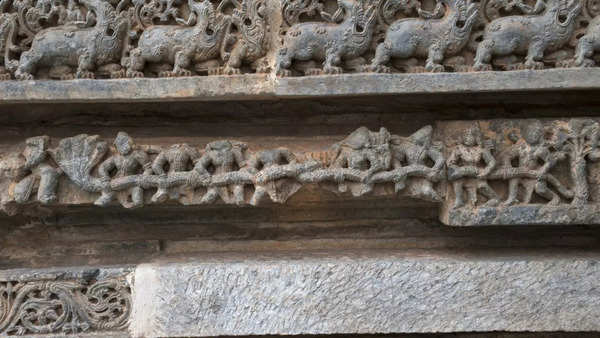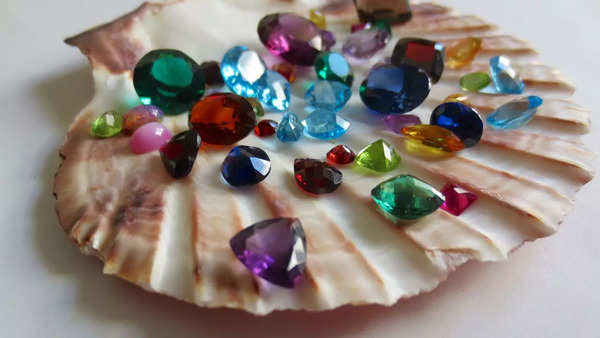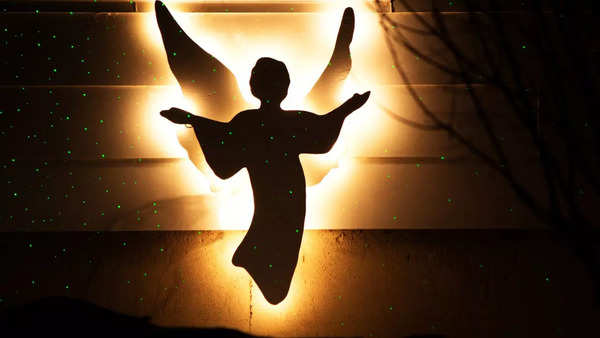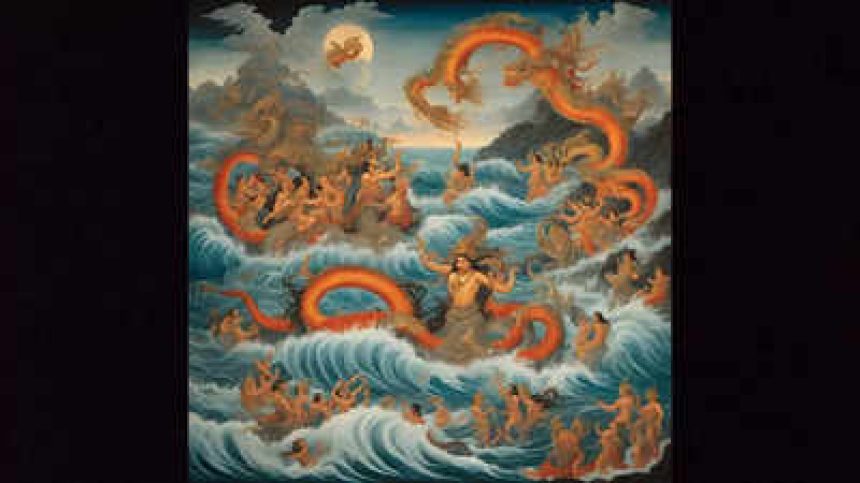The churning of the ocean, or Samudra Manthan, is one of the most interesting incidents in Hindu traditions and beliefs. It showed the eternal struggle of the Devtas and the Asuras, and the rewards and poisons they got with the churning.
It all began when the Devas and Asuras were in constant conflict, and even though the Devtas had more divine powers, the Asuras were trying to overpower them, and even managed to do so by taking control of the Universe.
In a state of worry, the Devtas went to Lord Vishnu for help, who suggested churning the ocean of milk, the Kshirasagar, to obtain the nectar of immortality, or Amrit. He claimed that this divine nectar would restore their strength and ensure their victory over the Asuras.
But as they realised that this task needed extreme efforts, and they would have to take the help of the Asuras, they were hesitant. But Lord Vishnu assured them that the Amrit would be theirs, and they would be able to defeat the Asuras soon.

Lord Vishnu’s Kurma avatar
The churning of the ocean was no ordinary feat, and it needed a divide rod and nope to extract the Amrit. And so, mount Mandara, a massive mountain, was chosen as the churning rod, and the serpent king Vasuki was used as the rope. But, as the churning began, Mount Mandara started sinking into the ocean due to its weight. And so, Lord Vishnu took the Kurma avatar, a giant tortoise, to support the mountain on his back. He gave the mountain a strong foundation, and then the Devas and Asuras continued to work together in order to get a part of the Amrit.
The Halahal

As the churning started, the first thing to emerge was Halahal, a deadly poison that could end all life in the Universe, Gods, demons, and humans alike. And as they could not continue without someone acquiring the poison, the Devas and Asuras sought help from Lord Shiva. And so, he agreed to consume the poison to save the universe, but held it in his throat to stop the poison from spreading. This made his throat turn blue, and soon he became the Neelkanth, one with the blue throat.
What came next?
After the poison was contained, the churning continued. And next up came 13 more gems, all with their own merits and demerits.
One of them was Kamadhenu, a cow who could fulfill every wish. This cow was called Surabhi, and Lord Vishnu gave this cow to the Rishis and saints.
After her, the Universe was granted Airavata, a magnificent white elephant with multiple trunks. Airavata was picked by Devraj Indra, the king of gods, and he became the symbol of majesty and power all across the Universe.
Next from the churning came Uchchaihshravas, a celestial seven-headed horse with beautiful wings, and it was the symbol of grandeur and beauty.

Then came the Kaustabh mani, a rare jewel that shined as bright as a thousand suns. And with it came Parijat, a celestial flowering tree, which was taken to Indra’s paradise. The Parijat is thus considered to have come on Earth from the heavens, and it blooms beautifully all year round.
Next up is the Saranga, the bow that Lord Ram came onto Earth with. The Saranga became one of the most famous bows, along with Pinaka and Kodanda.
Then came in Chandra, the moon, a celestial body that was placed on Lord Shiva’s head to soothe burning of the Halahal that he consumed. And also came in the Panchjanya, the divine conch, blowing which the Mahabharat started.
From the churning also came Maa Lakshmi, and Alakshmi, her elder sister. Goddess Lakshmi became the giver of wealth, prosperity, and happiness, and became the consort of Lord Vishnu, and Alakshmi, her elder sister, remained forever in envy of her.
There were also Apsaras and celestial nymphs that came in during the churning, and Rambha was one of the most famous ones. The world also got Varuni, the goddess of wine, who was taken by the Asuras.

And at last came in Lord Dhanvantari, the celestial physician, who emerged with a pot of Amrit, the divine nectar that was consumed by the Devas.
After the Devas consumed the Amrit, they were finally strong enough to defeat the Asuras, and after the battle ended, the Asuras were pushed back to the Patal Lok.








